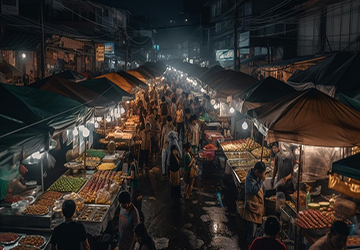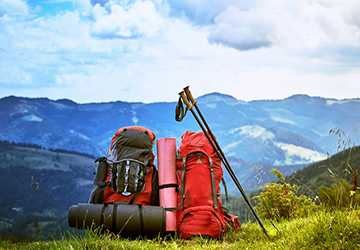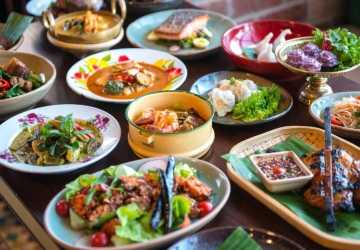When traveling abroad, you usually won't find what you typically eat or things you cannot, so your choices become limited. You want to explore many cultures and their culinary delicacies, but your dietary preferences restrict you. What to do if that is the case, and how to navigate culinary and dietary landmines? Read the article and learn how to be prepared for people like you.
1.Research and Prepare
Preparation through research should always be the first step if you travel abroad, not just because of your restrictions but also because of what excellent food you can try. You will experience fantastic taste cultures, so staying informed about what you will eat there is a good practice.
Take online courses, watch travel vlogs, read articles, and see what the most common ingredients or ways to cook are practiced there. This way, you will know what to eat and what not to eat beforehand.
Furthermore, based on your diet, you need to check whether the diet you eat is readily available there and what are the most common supplements or alternatives to that. Those there for studies can contact their student mess or international coordinator for more information.

2.Add More Starchy or High Fiber Carbs into the Diet
Instead of worrying about what to eat 3-4 times a day, why not bring it down to 2 times and keep snacks for off times? You can reduce your meals by eating high-fiber diets such as wholewheat pasta, potatoes, bread, etc., which keep you fuller for longer. Secondly, they give you enough energy till your next meal to explore the city you are in and enjoy the sightseeing.
You can include a starchy component in your meal as they take longer to digest and keep you satiated.
3.Learn the Basics of the Language
Learning the basics of the language is a must. If you are there just for a few weeks of traveling, we understand you may not need it longer, but at least learn essential phrases. You must know how to say or listen to "I cannot eat this" or "Do you know where I can find the X food?"
Furthermore, you should learn about things you are allergic to and explain why you need a doctor if you accidentally eat it. We recommend practicing these essential phrases with a local so you know if you are making any mistakes and can communicate adequately.
4.Always Pack Travel-Friendly Snacks
You should prepare some snacks that align with your dietary choices before traveling. The most common travel-friendly snacks are biscuits, energy bars, chocolates, nuts, etc., and you can find similar alternatives in the country you are traveling to. During your stay, you can also stack up on those snacks so that whenever you are hungry and your preferred food isn't nearby, you can munch and won't go hungry.
5.Eat Fruits and Vegetables
Fruits and Vegetables are mostly the same worldwide and are readily available. You can make different portions for the day and freeze them to eat when needed. You can mark other markets where you can buy them for the day and keep your healthy diet in any case that may arise.
You can also mix fruits and vegetables with cereals, which you can eat at any time of the day as breakfast or a snack. Most Western countries have fruit and vegetable juices, a healthy diet that keeps you satiated. However, do take care if they contain sugar and limit the sugar intake as much as possible.
6.Taking Medical Care Before You Go
When you are done with the first step of this article, you should take the research you have done to your doctor. They may need to be better versed in the dietary nuances of the country you are traveling to. Once they get your research info, they can help you navigate which local foods and diets suit you.
Secondly, you must take care of medicine if you eat a dish or food containing allergic ingredients. In that case, proper medication should be at hand. Please keep the original prescription along with your medicine to show it to customs. Finally, you can consult with medical practitioners from your university abroad to help you with medication.

7.Talk Beforehand with Café or Restaurant Staff
Knowing the local ingredients and some essential phrases, you can always talk with the staff before ordering anything from the menu. Please ask for a senior if servers must be aware of your needs. This will help them to point out things you can quickly eat. Be polite and explain appropriately so they may serve you better.
8.Bookmark Important Websites
Important websites for medical restrictions when it comes to diet.
· · · If you have some religious restrictions, the following website will provide extensive information about halal or kosher food.
The following are tips and resources for people with vegan or vegetarian dietary restrictions.
9.Utilize and Keep Allergy Cards
Search online for names of allergic foods and dishes in the country you are traveling to. Once you list those allergies or foods, print them. Keep a few copies with you and show them to restaurants, cafes, or universities to give them the information. It will be easier for them to serve when they know what to do.
10.Adapt Local Cuisine
When you have followed most of the strategies mentioned in this article, you know how to make your life easier during your time abroad. Now, start adapting to dishes and options that conform to your restrictions and their taste.
Adaptation makes it much easier to eat local food and get accustomed to it, allowing your stomach to adjust.
Conclusion
Preparing for most things you do is always good practice, especially when eating, so ensure you follow these tips as much as possible.





